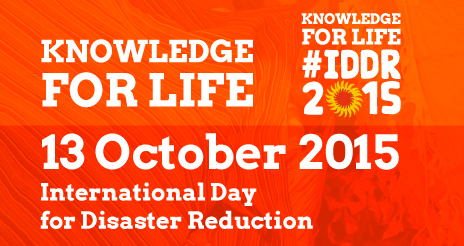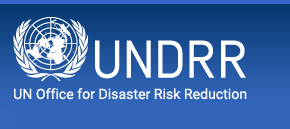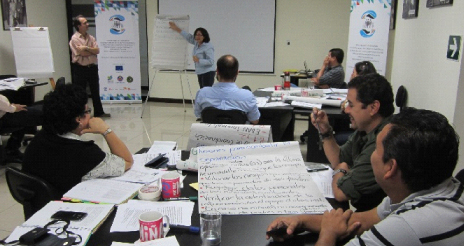- Our Mandate
- Mission and Objectives
- UNDRR in the UN
- Work Programme & Annual Reports
- Results Based System
- Work Partnerships
- Headquarters - Geneva
- SG-UN representatives for DRR
- Regional Office – The Americas and the Caribbean
- Head of the Regional Office – The Americas and the Caribbean
- What is Disaster Risk Reduction?
- What is the International Strategy?
- History of UNDRR
The protection of vulnerable people: More necessary year by year
By: Fernando Quezada. Edited by: UNDRR – The Americas.
GUATEMALA, Guatemala, July 14, 2015 – With the aim of conducting a process of institutional strengthening on the principles of protection and support the actions of relevant bodies on issues of disaster risk reduction to promote the protection of the most vulnerable people at the territorial level, starting in July 2014, the regional project “Protecting vulnerable groups in Central America through the inclusion of protection principles in preparedness and response” is being implemented in Guatemala in the framework of the IX DIPECHO Project 2014-2015.
According to the World Risk Report 2014 of the United Nations University, Guatemala ranks fourth in a list of countries with the greatest vulnerability to disasters, demonstrating the need for action on disaster risk reduction.
As part of the project and during the workshop to strengthen institutional capacities, conducted recently with representatives of the National Coordinator for Disaster Reduction (CONRED), Iris Moran, as part of the team of the CONRED Coordination Directorate, said: "As a signatories of the Protection Principles emanating from the Sphere project, CONRED supports initiatives aimed at promoting the rights of vulnerable groups within the framework of Integrated Risk Management, through the incorporation of the Protection Principles.”
The project, implemented by a partnership between Plan International, Save the Children, World Vision and the Norwegian Refugee Council, has created guidance documents for the institutions on the practical application of the protection principles, creating a series of products including an operational guide, 10 thematic notebooks on preparedness and response, a communication strategy and promotional leaflet material.
The organizations of the Guatemalan State participated in the process, recognizing the importance of building their capacity on the subject, towards institutional work focused on risk management, as a complement to the auxiliary role at the civil society level.
The “Protection Principles" project, funded by the Humanitarian Aid and Civil Protection Department–ECHO- and regionally coordinated by the Coordination Centre for the Prevention of Natural Disasters in Central America (CEPREDENAC) and at the country level by the National Coordinator for Disaster Risk Reduction (CONRED), whose organization has coordinated and joined forces with institutions from the education, human rights and NGO sectors, among others.
About ECHO.
The European Commission’s Humanitarian Aid and Civil Protection Department (ECHO) is responsible for the assistance is provided to victims of crises and natural or man-made disasters, including those that occur outside the European Union (EU). Since 1998, ECHO has invested more than €52 million in Central America through its DIPECHO program. Funds aimed at promoting prevention and risk reduction, including among others, the creation and strengthening of early warning systems, the development of emergency plans, awareness campaigns and carrying out small infrastructure works, among others.
About the IX DIPECHO Action Plan, 2014-2015
“Protecting vulnerable groups in Central America, through the incorporation of humanitarian principles of protection preparedness and response”
It is implemented by Plan International, World Vision, Save the Children, Norwegian Refugee Council and CECC-SICA in coordination with the Coordination Centre for the Prevention of Natural Disasters in Central America (CEPREDENAC).
The project will strengthen regional, national and local capacities to ensure that the specific needs of highly vulnerable groups (with attention to women, children and migrants) are taken into account before, during and after emergencies through collaboration with DIPECHO partners, the regional, national and local Risk Management systems and the protection systems.
Related links:
Read original note
Follow the UNDRR news online:
 International Day for Disaster Reduction #DIRD 2015 Knowledge for Life
International Day for Disaster Reduction #DIRD 2015 Knowledge for Life
More information

 Gloria Castro, Human Rights Ombudsman, Guatemala, accompanied by Alberto Gómez, consultant. Photo creidt: Fernando Quezada, Plan Internacional GTM.
Gloria Castro, Human Rights Ombudsman, Guatemala, accompanied by Alberto Gómez, consultant. Photo creidt: Fernando Quezada, Plan Internacional GTM.